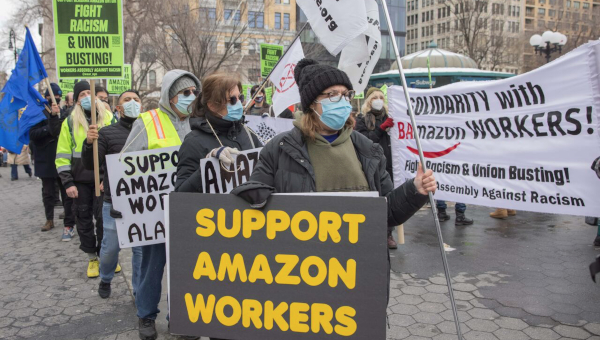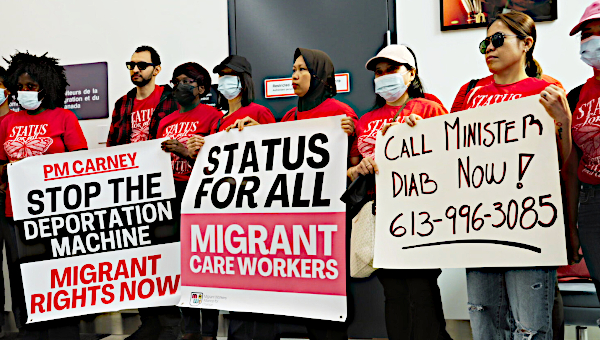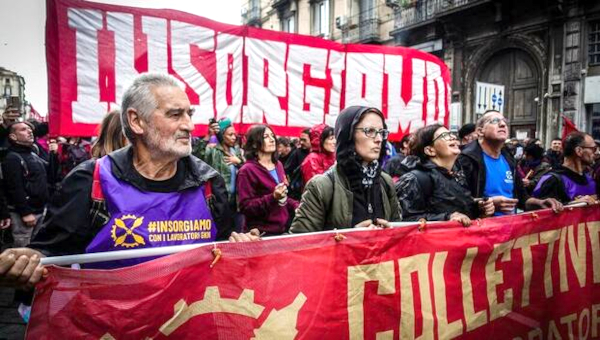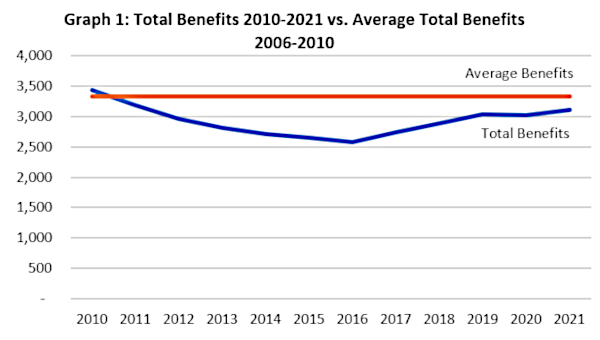Producing Medical Equipment for Social Need
Expand Production to Include N95 Masks at GM Oshawa
On April 24, the Canadian government announced a letter of intent to convert a portion of the GM Oshawa complex for the manufacture of much needed medical masks (personal protective equipment or PPE). Green Jobs Oshawa welcomed this important step forward.
However, it soon became apparent that GM’s plans for Oshawa are far short of what is needed. They are using only 50-60 workers and are making Level 1 surgical masks, not N95 masks (a higher level of protection needed especially by healthcare workers).
Manufacture N95 Masks in GM Oshawa Now
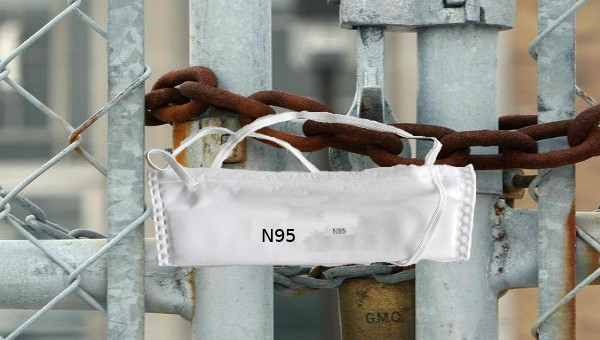
General Motors Canada has the ability to manufacture millions of N95 masks in Oshawa:
- GM is already manufacturing N95 masks in the Warren, Michigan plant, and Warren is the template that was used for setting up mask production in Oshawa.
- The GM Oshawa complex has 10 million square feet, most of which is not being utilized. The existing mask production project is reported to use only 30,000 square feet. There is ample room to expand production.
- GM Canada plans to employ 50 to 60 workers for mask production. When GM eliminated vehicle production in Oshawa in December of 2019, they eliminated the jobs of 5,000 highly skilled assembly and supplier workers. Thousands of those workers are available and would be eager to manufacture N95 masks and other urgently needed personal protective equipment (PPE) for front line Canadian workers.
General Motors of Canada asked for, and received $11-billion of public money in 2009. Now, GM of Canada is in the position of being able to make a significant contribution to the public good in Ontario and Canada by greatly expanding manufacturing of PPE in Oshawa, including N95 masks. If GM Canada will not voluntarily support our communities, we call on our governments to use their emergency powers and order it to be done.
Shortage of 100 Million N95 Masks
Canada has a shortage of over 100 million N95 masks, as well as shortages of other key PPE and medical equipment.
Instead of ensuring that all front line workers wear N95 masks (the best protection against airborne infections), health institutions have instituted rationing, locking up the limited supply of N95 masks, and encouraging health workers to rely on surgical masks instead.1
The results to front line workers are devastating.
4,043 Infections and 9 Deaths
As of May 19, there have been 4,043 cases of COVID-19 among healthcare workers in Ontario – 17% of all cases in the province. That is more than four times the infection rate in China. Nine of those workers have died. Other front line workers in retail and transportation also are impacted by PPE shortages.
Government should be requiring that all front line workers who have direct contact with people who may be infected wear N95 masks.
To ensure an adequate supply of N95 masks, government should order that they be manufactured here. They have not yet secured sufficient production either through imports or domestic production, which is why the obvious solution is to greatly expand PPE production at GM’s Oshawa complex. The Ontario government can order this under its existing emergency powers. The Canadian government also has the ability to order production under its own emergency legislation. •
This was issued by Green Jobs Oshawa on May 20, 2020 and was published on their website: www.greenjobsoshawa.ca/news.html.
May 20, 2020
Scott Bell
GM Canada President and Managing Director
Re: Add N95 Masks to Oshawa Production
Dear Mr. Bell,
On April 24, the Canadian government announced a letter of intent to convert a portion of the GM Oshawa complex for the manufacture of much needed medical masks.
Green Jobs Oshawa welcomed this important step forward.
However, it soon became apparent that GM’s plans for Oshawa are far short of what is needed.
We are calling on you to vastly increase the amount of PPE production in Oshawa immediately, and in particular, to add significant capacity for the production of N95 masks.
Front line healthcare workers are becoming infected and dying because of the desperate shortage of N95 masks. Over 3,600 healthcare workers in Ontario have been infected – 17% of all cases in this province. At least 9 have died. The main cause of this horrible toll is that our medical institutions have restricted access to N95 masks, or encouraged front line workers to use lesser protection, primarily because the supply is so low. Other front line workers including in retail and transportation also are impacted by these shortages.
You are aware that there have been urgent and growing public demands for Canadian manufacturing of N95 masks and other necessary PPE, including from the unions of front line workers such as the Ontario Council of Hospital Unions/CUPE, SEIU, Ontario Nurses Association, and the UFCW.
Canadian government data shows that over 104 million N95 masks are on order, but only 1.7 million N95 masks that meet Canadian standards have been delivered as of May 14. That means there is a shortage of over 100 million N95 masks.
General Motors Canada has the ability to manufacture millions of N95 masks in Oshawa:
- GM is already manufacturing N95 masks in the Warren, Michigan plant, and Warren is the template that was used for setting up mask production in Oshawa.
- The GM Oshawa complex has 10 million square feet, most of which is not being utilized. The existing mask production project is reported to use only 30,000 square feet. There is ample room to expand production.
- GM Canada plans to employ 50 to 60 workers for mask production. When GM eliminated vehicle production in Oshawa in December of 2019, you eliminated the jobs of 5,000 highly skilled assembly and supplier workers. Thousands of those workers are available and would be eager to manufacture N95 masks and other urgently needed PPE for front line Canadian workers.
General Motors of Canada asked for, and received $11-billion of public money in 2009. Now, GM of Canada is in the position of being able to make a significant contribution to the public good in Ontario and Canada.
We urge you to commit to immediately expanding the Oshawa PPE manufacturing project, including adding N95 masks.
Rebecca Keetch, laid off GM worker
Tony Leah, GM retiree
for Green Jobs Oshawa
Contact:greenjobsoshawa@gmail.com
Rebecca Keetch (905) 995-4047
Tony Leah (416) 471-7005
cc: Dave Paterson, Vice President, Corporate and Environmental Affairs
Jennifer Wright, Director, Communications
Colin James, Unifor Local 222 President
Jason Gale, Unifor GM Unit Chairperson •
Green Jobs Oshawa: Fact Sheet
Essential Services and Essential Production
Over 4000 front-line workers have been infected by the COVID-19 virus, more than 1 in 6 of all those infected in Ontario. Among the total population under age sixty, 30% of those infected are front line workers.
On a per capita basis, Canada has among the worst records in the world in the number of frontline health workers infected by COVID-19.
A survey of CUPE healthcare staff found that 87% of healthcare staff ‘do not have access to the PPE they need to deal with COVID-19 patients’. The Ontario Nurses Association made and powerfully documented similar concerns.
Of the close to 250 cases of unions filing health and safety complaints to the Ontario Ministry of Labour, the Ministry “has not upheld a single one.” (One of Premier Ford’s early cuts, signalling his priorities, was in the number of health and safety inspectors. But it’s not just the numbers of inspectors that matter but who they are committed to protecting).
Complaints of inadequate equipment have come from other front-line workers outside the health sector, including Amazon. When the federal government signed a contract for Amazon to be the distributor of health equipment there was no quid pro quo for protection for workers.
According to the Ontario Ministry of Health, within the long-term care sector an astounding 39% of the infections as of May 18, 2020 are of staff (even though they are a fraction of the population in these homes).
According to the same Ministry of Health data, as of May 14, 2020 in a number of long-term care facilities the number of staff infections are almost the same as, or higher than those of patients.
| Facility | City | Staff | Patients |
|---|---|---|---|
| Downsview Long Term Care Centre | North York | 92 | 47 |
| Madonna Care Community | Orleans | 50 | 21 |
| Extendicare Laurier Manor | Gloucester | 31 | 9 |
| Villa Leonardo Gambin | Woodbridge | 27 | 7 |
| Anson Place Care Centre | Hagersville | 29 | 28 |
| Cooksville Care Centre | Mississauga | 16 | 15 |
| Elm Grove Living Centre | Toronto | 43 | 44 |
| Altamont Care Community | Scarborough | 62 | 66 |
| Camilla Care Community | Mississauga | 54 | 60 |
As of May 14, 2020, the federal government had ordered 105 million N95 masks to distribute across the country. N95, masks are constructed to do what surgical masks can’t: fit the face and filter out 95% of the dangerous particles that cause contagion. According to Public Services and Procurement Canada some 11 million N95 masks have been received (11%) and – astonishingly – less than 2 million have met the test for adequacy.
When the health crisis started all governments scrambled to find new masks, particularly the N95 masks. The stunning shortage of such masks has many causes:
- After the SARS crisis, recommendations were made to stockpile protective equipment in preparation for future outbreaks. Governments, more concerned with cutting social programs, ignored the advice. (Premier Ford came to office proudly declaring his determination to cut healthcare and other social programs further.)
- The complex international supply chains that came with globalization interrupted the flow of materials and components for the more complex masks.
- The US imposed limits on mask exports from the US.
- Dealers in such equipment promised they could find suppliers but were completely unreliable and millions of the masks received were defective or didn’t meet Canadian standards.
- Especially important, with every country competing for masks, the only solution would have been to convert domestic facilities.
Not having a strong manufacturing base with the capability of converting, alongside governments too timid to introduce an emergency conversion plan that companies had to follow, obviously limited the supply of masks – which hospital management exploited to say they had no choice.
On April 6th GM began production of masks including N95 masks at Warren, Michigan and ventilators on April 15th at Kokoma, Indiana. GM Canada is not making any ventilators, only starting mass production of masks a distressing 5 weeks later, is not making the critical N95 masks at all, and making 1/3 as many masks as Warren with proportionately fewer workers even though Oshawa is a much larger facility.
In the US, the President used his emergency powers to order GM to make the ventilators and GM seemed to get the message in moving on to the masks. In Canada, the emergency powers were not used in spite of the extreme shortage of N95 masks and other equipment, nor were there any indications that either the provincial or federal governments pressured GM to make N95 masks.
The government did however use its emergency powers to remove vital workplace rights that workers had negotiated in their agreements. A good case could however be made that public sector workers and their unions have grasped what is best for the healthcare of the province’s residents and acted as a vital check on governments as well as protecting their members’ health – their influence needs to be strengthened, not diminished. •
Ontario is Failing to Protect Healthcare Workers
Pam Parks, Judy Bain and Maggie Jewell
There are painted rocks, flower bouquets and handmade signs outside our hospitals and long-term-care homes. These are welcome offerings. The thanks to healthcare workers inside touch us deeply. It all helps. For the legion of us on the ground – working throughout the COVID-19 pandemic in hospitals, long-term-care homes, paramedic services, home and other community care settings – the reality is, that things are grim.
It has never been grimmer. In nearly 100 years of nursing, we’ve dealt with many medical emergencies. We nursed through SARS. Nursed the old and the very young, some of whom died in our arms. But nothing compares to what we’re dealing with since COVID-19.
Ontario healthcare workers are dying and we have a rate of infection that nears the most severe in the world. We need our provincial government to significantly change its approach to this virus and the support given to us fighting to keep others alive during this crisis.
Reflection and improvement are an essential part of our nursing practice. All of us must reflect on whether we can approach COVID-19 differently and affect the outcomes for the people we care for and that of those we work alongside.
When Ontario downgraded safety protocols in the face of a supply shortage to treat this virus as though it can’t be transmitted by air outside of aerosolizing procedures, we began to worry about our safety and the safety of patients and residents. With the safety protocols downgraded came the green light for a much lower level of face protection.
Now the vulnerability to infection is palpable the moment we step into our workplaces because we don’t have access to the masks and other protections we should. We are afraid of dying. We worry about taking COVID-19 home and infecting our family. Thousands of us sleep in basements, sheds and trailers so we won’t pass the virus to our kids and partners.
COVID-19 is lurking. It could come the next time we care for a patient or resident, screen or admit anyone, disinfect an emergency room, empty a garbage bag, fix a burst pipe. It could come from a co-worker, who because we are not all tested is unaware they are COVID-19 positive.
Access to the higher-level N95 masks and other personal protective equipment (PPE) would keep infection rates lower. Perhaps those who advise the premier are telling him all is in hand – that healthcare staff are getting PPE. This is not true. Many nurses, personal support workers, cleaners, dietary staff, admitting clerks and maintenance people are being denied N95s even when dealing with a COVID-19 positive or assumed COVID-19 patient or resident.
Many more are being given just one surgical mask and gown and told to make these sodden, soiled and supplies last the day. Colleagues across the province report there is not enough PPE supply to don and doff masks, gowns and gloves as we go from one patient and resident’s room to another. This is at odds with good infection control practice and leaves healthcare settings rife for virus transmission.
More than 3,700 Ontario healthcare staff are infected with COVID-19. That’s 17 per cent of all cases in the province. Countries that isolated COVID-19 positive people in hospitals, tested widely and protected healthcare workers using airborne protections fare much better than Ontario.
With 81 per cent of COVID-19 deaths being in long-term care, it suggests to us that Ontario’s approach is failing. New York state ordered care homes to transfer residents with COVID-19 who they can’t look after to hospital.
Finally, we are thankful for the pandemic pay subsidy. We appreciate the gesture, and the recognition we get from the premier. But, our nursing is supported by an army of ward clerks, clerical staff, dietary aides, maintenance, sterilization, technologists and spiritual and lab and pharmacy staff, among others. We are all on the front lines battling COVID-19. All our work is physically and emotionally exhausting, dangerous and deeply undervalued.
Yet half of us don’t get the pandemic pay. What it suggests to our co-workers is that their work is not front line or valued. All of us are a team. Do not divide us. Treat us all equal – protect and pay us all. •
This article first published on the Toronto Star website.
Endnotes
- For example, Lakeridge Health in Durham issues only one surgical mask per 12 hour shift to health professionals coming in contact with potential COVID-19 patients. N95 masks are reserved for only the most dangerous procedures. Lakeridge has also ordered staff not to use PPE that they obtained themselves.


